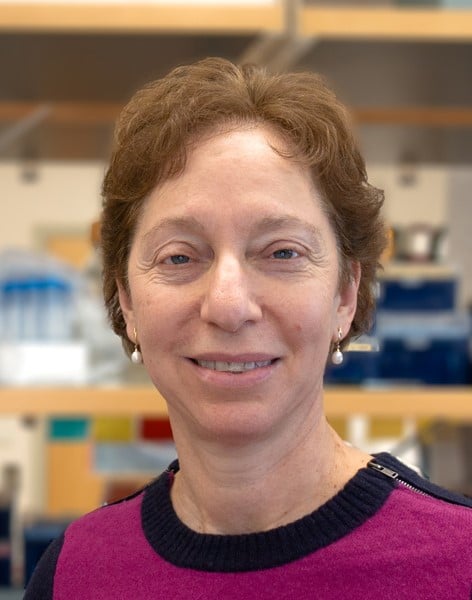Merav Socolovsky, MBBS, Ph.D.
| Professor |  |
|
| MBBS, Ph.D.: 1993, University of Cambridge, Cambridge, U.K. | ||
| Postdoctoral research: Whitehead Institute for Biomedical Research | ||
| Office: | UMass Chan Medical School 364 Plantatio Street, LRB-403 Worcester, MA 01605 |
|
| Phone: | 508-856-3743 | |
| Email: | Merav.Socolovsky@umassmed.edu | |
Research
Mammalian erythropoiesis is the process by which blood stem cells differentiate into red blood cells. It is an accessible experimental system that allows us to address fundamental questions in biology and disease.
Erythropoietic deficits are common worldwide, manifesting as anemia or malignant conditions such as myelodysplasia or myeloproliferative disease.
We investigate how cell fate decisions during erythropoiesis are orchestrated by DNA replication and by epigenetic mechanisms. We also study the systems biology principles that allow a massive ramping up of red cell production in response to the stress of bleeding, anemia of multiple etiologies, or hypoxia.
Click here for a complete list of published work
Rotation Projects
Tet proteins in erythroid global DNA demethylation
Tet proteins are implicated in DNA demethylation, but their role in differentiation is unclear. Our lab discovered that erythroid precursors undergo global demethylation during differentiation (Shearstone et al. Science, 2011). This project investigates the role of Tet proteins in erythroid DNA demethylation and differentiation.
DNMT1 localization to replication foci in erythroblasts
The maintenance methylase DNMT1 is a candidate regulator of erythroid DNA demethylation (see 1st rotation project). It usually localizes to replication foci of dividing cells, where it methylates nascent DNA. This project will determine whether DNMT1 is excluded from replication foci of demethylating erythroid precursors.
CDKs as regulators of replication forks and cell fate
Our recent results suggest that an erythroid cell fate decision is associated with a transient acceleration of replication forks. This project will determine the effect of small molecule CDK inhibitors on replication fork speed and on cell fate.
Positions Available
A postdoctoral associate position is available. The Socolovsky lab investigates the process of mammalian blood cell differentiation, with a focus on epigenetics and the cell cycle. Please visit the Lab Website for details on available research areas.
Applicants should have a Ph.D. in Cell, Developmental or Molecular Biology and be creative and highly motivated. Please send a brief statement of your scientific work and interests, a CV and the name and email address of three referees, to Merav.socolovsky@umassmed.edu